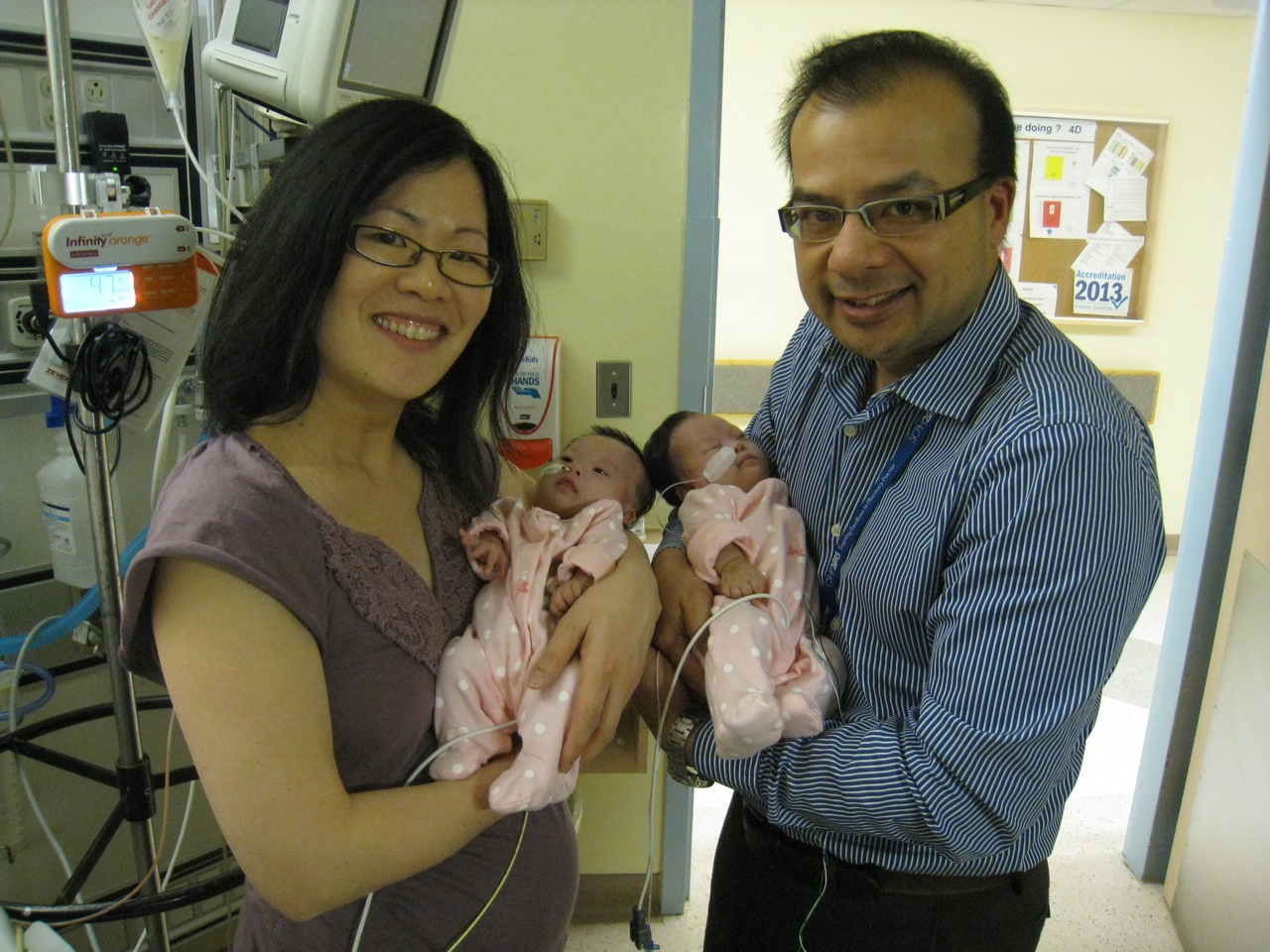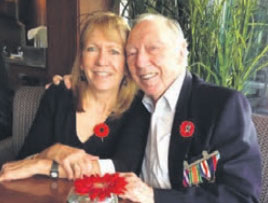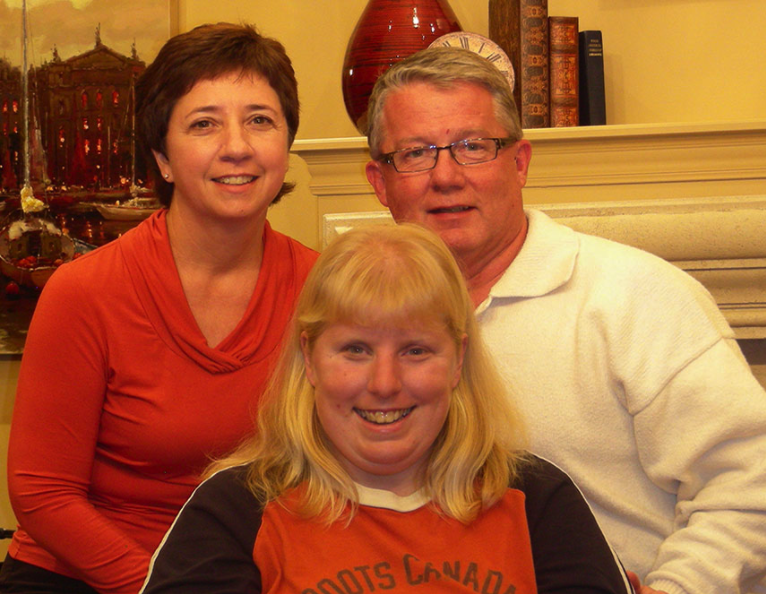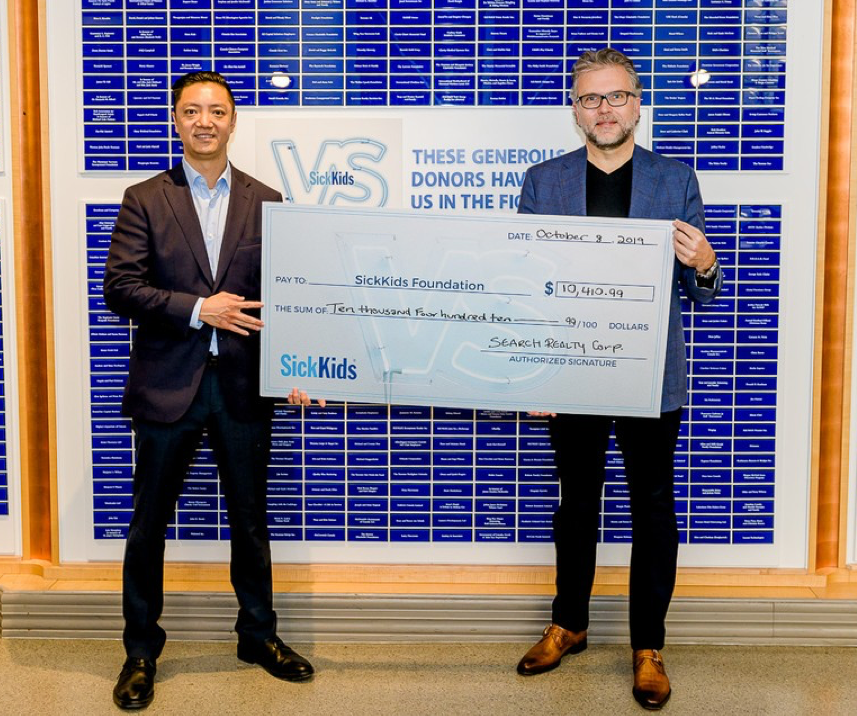Supporters Like You
– Sophie Lu, SickKids Legacy Giver
Read about supporters like you who have made a better future for child health a part of their lasting legacy.

Cindy and Jim Tjon
Why legacy giving is important to this Toronto family
SickKids came through when the Tjons’ twin daughters were born with multiple medical conditions, from NEC to Down syndrome to leukemia.
Read more of their story
When Cindy and Jim Tjon welcomed their twin daughters, Charlotte and Ella, into the world, they didn’t expect to begin their journey in the neonatal intensive care unit at The Hospital for Sick Children (SickKids). Born prematurely, the girls quickly became closely connected to the hospital that would save and shape their lives.
At just five days old, Charlotte was diagnosed with necrotizing enterocolitis (NEC), a life-threatening disease affecting premature infants. Emergency surgery at SickKids saved her life. Both girls were also diagnosed with Down syndrome and transient leukemia. In Charlotte’s case, the leukemia progressed to acute myelogenous leukemia (AML), requiring six rounds of chemotherapy. Each child also underwent open heart surgery—all within their first year.
“That was their first home,” said Cindy. “Charlotte went outside for the first time at SickKids — there were a lot of firsts happening at SickKids.”
Children with Down syndrome under five are significantly more likely to develop AML, but they also respond better to chemotherapy. Charlotte has been in remission since 2014, and both girls, now 12, are medically stable and able to lead a fairly regular life.
SickKids’ personalized approach to care played a significant role in Charlotte’s recovery. Through its Precision Child Health initiative, SickKids tailors treatments to each child’s unique needs—improving outcomes and saving lives.
Today, the girls still visit the hospital for occasional checkups. “Even though our girls have Down syndrome, they’re not quite like other kids with Down syndrome. They have more complexity — for example, they don’t walk yet,” said Cindy. However, they’re thriving—attending school and enjoying community programs such as music therapy and cooking classes.
Inspired by their experience, Cindy and Jim decided to include SickKids in their will. “Donating to SickKids as part of our will represents a real, tangible way — and relatively easy way — for us to say thank you,” said Jim, a clinical pharmacist at the hospital. His mother also worked at SickKids as a nurse for 30 years.
“On many levels, we’re a true SickKids family,” he added. “This donation symbolizes our deep gratitude to the hospital.”
“Because of SickKids, our family can make memories with our twin girls,” said Cindy. “We’re leaving a donation in our will to ensure that families in the future can continue to enjoy time with their children, just like we have.”
Knowing they are giving back brings Cindy a sense of peace. “When I live in that way, it does wonders for my heart and my mind — the satisfaction of knowing that I will be able to help other families in the future is so uplifting to me.”
Thanks to SickKids, the Tjon family has built a life filled with hope and joy—and they’re proud to support a brighter future for all children.


Bruce Parker
For this dad, giving back to SickKids started with a desire to help other kids and families—while still supporting his own.
Read more of his story
Bruce Parker felt understandably shaken when he learned that his son would need open-heart surgery. After all, his boy—Robbie—hadn’t been born yet. But before staff at SickKids could even perform that complex procedure, they suspected little Rob had experienced a stroke in utero, triggering premature labour and an early arrival. Says Bruce:
“We almost lost him that first night.
It was touch and go for the first few weeks after he was born.”
When Rob was almost a month old, he underwent surgery at SickKids and, thankfully, recovered. “The skill, care, and compassion of the nurses and doctors got us through those early weeks before and after the surgery,” says Bruce.
Several months later, however, Bruce noticed that Rob began to develop seizures. For months, then a whole year, he watched his son struggle with seizures despite the use of different medications. Bruce turned to the SickKids Division of Neurology for support, including a rare surgery for people with epilepsy who are not responsive to medication. Known as a hemispherectomy, this scary-sounding procedure either removes part of the brain or disconnects it from the rest. “Since that time, he’s been seizure-free and continues to grow and thrive,” says Bruce of Rob, who is now 12 years old, learning to play the trombone, and enjoys watersports with his dad.
Taking care of Rob and his younger brother, Morgan, remains a top priority for Bruce and his wife, Jeanette. But the web content coordinator says he also wants to support SickKids with “its incredible delivery of the best care to children, because without the hospital and its staff’s expertise, compassion, and knowledge, Rob would not be with us or have the quality of life that he enjoys.” That’s why, after speaking with his own parents about the process, the 53-year-old recently added a gift to SickKids in his will. He was surprised—and is still discovering—all the tax benefits of these legacy gifts. And, now, he can help both his family and others at the same time.
Bruce says he hopes his legacy gift will ease the lives of other SickKids families by improving their stay or facilitating a “future research discovery [that] helps improve a child’s chances of a long, happy and successful life.” He and many people who’ve had a loved one visit SickKids, which is widely regarded as one of the top children’s hospitals in the world, think of this place as “more than a hospital; more than the doctors, nurses, and support staff; more than the research.” Bruce adds:
“This is a place of hope for kids.”

Gary & Basha Bloch
Why Gerry & Basha Gave in Their Will: “Because SickKids helped us for three generations”
Gerry and Basha both knew SickKids well, having been treated at the hospital as children.
Read more of their story
As parents, that connection continued when their daughter needed care at SickKids as an infant. Years later, it was their granddaughter who needed unexpected surgery at just months old. With three generations of their family closely connected to SickKids, Gerry and Basha knew they wanted to leave a gift in their will. Their goal? Ensure the hospital’s work can continue for generations to come. As Gerry and Basha put it, “SickKids has been there to provide outstanding care and support – for us as children, for our daughter, and for our granddaughter. We hope our bequest will help the hospital continue to do so.”


Anita
Why Anita Gave in Her Will: “So SickKids is always there for those who need it.”
Read more of her story
When Anita’s daughter Aila was young, she saw a SickKids specialist to investigate some unusual neurological symptoms. Thankfully, Aila was fine. Grateful for the care her daughter had received – and for her family’s health – Anita decided she wanted to give back to the hospital. That’s why she bequeathed her will to SickKids, helping ensure that all families can access the care they need. “The staff, the caring and compassion SickKids shows parents and children, no matter if the situation is big or small, is remarkable,” says Anita. “If I can help even one family, then I am happy.”

Carlos Figueira
Why Carlos Gave in His Will: “SickKids was there for my son.”
Read more of his story
Carlos – a dad of three and grandfather of four – is deeply connected to SickKids. In 2004, his son Stephan, then 14, was involved in a dirt bike accident and treated at SickKids for various serious injuries. It was a terrifying time for Carlos and his family – but along the way, Carlos says he was “overwhelmed” by the level of care, support, and communication the SickKids team provided. That’s what inspired him to include a gift to SickKids in his will: ensuring the hospital is there for future generations.
“The dedication and commitment of the SickKids team who cared for my son was second to none,” says Carlos. “They were there for us: to keep it going, we have to be part of it.”


Dr. Paul Swyer & His daughter, Michèle
Michèle recalls feeling a sense of wonder as a young child when she visited her father, Dr. Paul Swyer, at SickKids in Toronto, where he headed the Neonatal Intensive Care Unit (NICU). It was a rather magical place for Michèle and her older sister, Sandra, who had the chance to peer through windows to watch incredibly small infants in their incubators, hooked up to an assortment of wires and tubes.
Read more of their story
“It was fascinating to see these babies that were tinier than my dolls, yet were alive,” says Michèle. “I was too young to understand fully, but somehow I knew that my father was going to make all those babies better.”
Over the years, Michèle came to learn the true extent of her late father’s significant contributions to the NICU at SickKids and to neonatology medicine around the world. To honour his memory and his accomplishments, she is leaving a legacy gift to SickKids Foundation.
“It’s gratifying to make this gift through my will so I can help my father’s work continue and further expand the realm of possibilities in his field, which is always progressing and saving babies at younger and younger ages,” she says.
Dr. Swyer was known as the “father of neonatology.” He established the first intensive care unit for premature and critically ill newborns at SickKids in 1961 and pioneered numerous treatments and innovations that significantly enhanced neonatal care and saved lives.
“My father led the team that developed ventilation, resulting in the first surviving ventilated baby,” Michèle says. “Many of his colleagues say that was the pivotal time that neonatology came into being.”
Dr. Swyer created the sub-specialty of neonatology within paediatrics and advanced clinical knowledge for the care of premature and sick newborns in numerous areas, including nutrition, neonatal transport and the regionalization and organization of neonatal care. In 1975, he authored the first textbook in the field, titled “The Intensive Care of the Newly Born: Physiological Principles and Practice.”
A significant part of her father’s legacy is in the realm of teaching, Michèle explains. Dr. Swyer taught at the University of Toronto, training Canadian neonatology residents as well as visiting fellows from abroad.
“He was a gifted teacher who was devoted to imparting his knowledge to others. The international fellows he directly mentored, coached, and inspired took that knowledge back to their own countries. In this way, the unit at SickKids became a model for the development of NICUs around the world.”
Her father’s wish was to have his name remembered in some form of teaching legacy, Michèle says. Accordingly, she has directed a portion of her donation to funding keynote speakers at an annual international neonatology conference held in Toronto by SickKids, called the T4 Health Conference (Triage, Transport, Treatment & Transition).
A HERO ON MANY LEVELS
“When we mark Remembrance Day every November 11th, I think about how my father was also a hero in the Second World War,” Michèle adds. Originally from England, Dr. Swyer served as a medical officer on the front lines, treating wounded Allied soldiers in countries such as Holland, Belgium, and Germany.
“In the war, he had to adapt treatments in difficult circumstances, and I think that training had an impact on his ability to adapt later and innovate to save the lives of fragile babies.”
The progress her father drove is illustrated by the changes in the mortality rates for premature and low-birth-weight babies. From the time Dr. Swyer arrived at SickKids in 1953 to his retirement in 1986, there was a dramatic increase in survival rates for those infants.
“There continues to be research needed and teaching to be done every day in the mission to heal and save the lives of vulnerable newborns,” says Michèle.
“I feel very proud to know that my legacy donation will help babies to thrive and go on to live healthy lives.”
*This story originally appeared in a Globe and Mail Estate Planning sponsor content feature in November 2020. Produced by Randall Anthony Communications. Reprinted with permission. All rights reserved.
—Michèle, SickKids Legacy Donor

Fred and Berla Hilker
Aside from a 48-hour labour, all seemed ordinary to the Hilkers when Jennifer was born. Then, at three months old during a routine examination, their local doctor sent the Hilkers to an emergency visit with a paediatrician who told them to take her to SickKids – now.
Read more of their story
An hour later, the Hilkers were at SickKids, where they met with a neurosurgeon who examined Jennifer carefully and explained that she had been born Hydrocephalic. This congenital condition causes enlargement of the skull and compression of the brain. Following the tests and ultimate diagnosis, the neurosurgeon took the Hilkers back into his office and spent more than one hour with them explaining what they and little Jennifer were facing. That day was the first of many trips to the Neurology department at SickKids.
While many hydrocephalic patients have severely impaired brain function, can be quadriplegic, and the disease sometimes results in death, Jennifer’s condition did not worsen. She had a speech impediment, but she crawled, walked, and hit other milestones right on schedule. Jennifer stayed in school and added several courses to her high school diploma, graduating at the age of 21. Today, at 28, Jennifer is an active, busy young woman who enjoys spending time with her friends and working as a Crew Trainer at McDonald’s.
“She is an unbelievable human being,” said her father, Fred.
From the time she was three months old until Jennifer was 7 or 8 years old, the Hilkers stayed with SickKids’ Neurology department. Fred and Berla have been donors to SickKids since that time, donating each year through various fundraising campaigns.
Recently, when they were updating their Wills, they included Jennifer in their discussion. Jennifer has savings and investments of her own, and her parents wanted to help her draft a Will that set out what she would do with her money if her parents and others close to her predeceased her.
All three of the Hilkers sat down with a lawyer who took the time to help Jennifer understand the magnitude of the decisions that she needed to make. There were tears in Jennifer’s eyes as she tried to imagine the possibility that something could happen to her parents and their other loved ones. The lawyer explained that if this were the case, Jennifer could choose to leave her money to someone or something that mattered to her. After the shortest pause, Jennifer stated simply, “SickKids.”
Her parents were amazed. They knew that Jennifer understood SickKids was at the end of their own succession planning in their Wills. She also knew that her parents felt strongly about the connection that they all have to SickKids, as Fred was also treated for an eye condition at SickKids when he was a child.
Today, the family has created a legacy spanning two generations at SickKids. Thank you, Fred, Berla, and Jennifer, for your extraordinary support.
Sterling Wong
As a child, Sterling Wong spent considerable time in the hospital, undergoing multiple surgeries. Born with a cleft lip and palate, he was treated by Dr. Zuker at SickKids. Even at a young age, he knew he wanted to give back to those who had cared for him with such dedication.
Read more of his story
Sterling had multiple surgeries throughout his childhood and spent a lot of time at the hospital. He fondly remembers when the Atrium opened and marvels at just how nice it was. He recalls how he used to challenge himself to find the quickest route from the parking lot to his hospital room. He also remembers just how nice and caring all of the staff and doctors were to him during a time when he was feeling vulnerable and a little afraid. “When I was being treated, I always wondered why all these nice people were helping me,” said Sterling. “I decided then that one day in my life I would give back to the people who helped me when I needed it most.”
And that is exactly what he is doing now through his companies, Search Realty Corp. and Search Mortgage Corp.
“Our Search Realty agents donate 1% of their sales towards SickKids,” said Sterling. “90% of our agents are currently participating in our fundraising efforts.”
For Sterling, giving back to the hospital that made such a difference in his life is important because “today’s children represent tomorrow’s future.”
“SickKids is all about helping children and providing the best care in the world with the best staff, doctors, and surgeons,” said Sterling. “I’m proud to be able to support that.”

—Sterling Wong, SickKids Donor and Former Patient
Join the J.P. Bickell Society
Together, we can heal the future.
By becoming a member of the J.P. Bickell Society, you’re joining a community of people who share your passion for creating a healthier future for kids in Canada and around the world.
